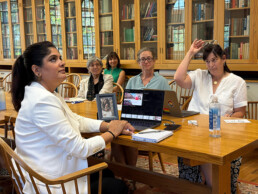It’s Time to Rethink the “Empty Nest”
Author Tembi Locke talks about the grief, joy, and evolution of sending a child out into the world
By Rebecca Carroll
When I was a budding young feminist growing up in the 80s, I would occasionally hear adults use the term “empty-nest syndrome” to describe the experience parents go through when their children leave home for college. The narrative around it was always very gendered, and usually homed in on the loss of identity for the mother: Who even was she without her children at home? I remember thinking, both judgmentally and naively, “Oh my god! Your children are not your identity! Women are more than just mothers!” I also thought it was a classist assumption that all kids go to college, but whatever.
Decades later, as I find myself going through this experience myself (my son just started his third year of college), I’ve come to realize that “empty-nest syndrome” is not about whether or not your kids are your identity, but rather, the complex shift in dynamic that happens when your children leave home, and the overwhelming sense of grief that can come along with it.
Lucky for me, and all of us, bestselling author Tembi Locke has a new audiobook memoir, Someday, Now, that is about precisely this. Locke’s first memoir, From Scratch, which was adapted into a Netflix miniseries starring Zoe Saldaña, followed her experience as a young woman studying abroad in Florence, where she falls in love with an Italian chef, marrying him, and then losing him to a rare form of cancer when their adopted daughter Zoela is just seven. Someday, Now picks up after more than a decade of Locke single-parenting Zoela, and it’s the summer before she’s about to leave for college. The two take a trip back to Italy together to prepare, reimagine, and find joy in the culture and comfort of extended family in another country. I was delighted to sit down with Locke to talk about this period of life that is often so swiftly dismissed, especially for women.

Rebecca Carroll: What are your feelings about the actual term “empty nest”?
Tembi Locke: I rebuke the word “empty” because nothing about my life is empty. Not my spirit, not my relationship with my child. And I’m not going to characterize my life with an adjective that starts with “empty.” I choose instead to take this time to think about what is full in my life, and what I would like to invite back into my life. I didn’t rush into a bunch of hobbies. I didn’t rush into a Zumba class. I just needed to hang out in the question and see what would emerge.
What do you think people get wrong about navigating this time in our lives as parents?
That there is a-one-solution-fits-all. Like, “Okay, I’ll cry. I’ll have my feelings the first month or so. And then I guess it just all kind of resolves itself in some way.” There’s this sense of not slowing down to acknowledge the depth, the tectonic shifts that are happening. I had a work colleague who said something along the lines of, “Oh, well, now you'll just have more free time, you can do more work!” And I was like, “I am so sorry. I lean way the hell out of that thought.” I actually need to slow down and really take inventory before I proceed.
I was so struck by the way you connected your grief about Zoela leaving with your grief over losing your husband. When my son left for college, it almost felt like a sick joke: Having this child of my body was such a balm, and then 18 years later, he leaves? I was not prepared for the sudden grief. Why don’t we ever talk about that emotion?
We’ve mostly lacked the language and rituals to process in those terms. Our children go off, and then it’s suddenly like, “Wait, what the hell just happened?” Because I have had the direct experience of grief before, I was like, “This feels eerily similar in my body.” So in a way that made me perhaps more acutely attuned to name it.
You talk in the book about making certain choices around what feelings to share with your daughter and which to save for your therapist…
What’s funny is, the first summer she came back, that’s when I realized, “Oh, it’s not just about us being apart and then coming back together.” That’s when the actual renegotiation of the relationship really began, because I understood that the child who left is gone now. I remember saying to her, “I’m not a roommate, I’m actually the person who will be up at night thinking about your safety at a certain hour.” I was trying to keep the long vision in mind, because for 18 years, my job was to rush in to some degree, fix things. But that’s not the role now. I also realized that feelings I experienced as my younger self were activated by my child leaving—and that is the work of a therapist to unravel.
My son and I were very close when he was younger, in part, I’m sure, because he knows that I am adopted, and he understood how important his biological connection is to me. Now there’s this letting go that feels like abandonment. I can’t not express sorrow…and yet, I don’t want to make him feel bad.
I try to pre-process some things for myself before I open my mouth. I was experiencing it, as I say in the book, with a tinge of maybe even shame. Like, how can I use the word “abandonment”? How is a child abandoning a parent?
To the idea of pre-processing—the summer before my son went off to college, I had two TV writing projects in the pipeline, which I had planned would keep me very happily distracted. Then the writer’s strike happened, and suddenly, I had a lot of time on my hands. I would have missed him anyway, of course, but without work to busy myself, I was almost paralyzed by his absence. It was bad. I couldn’t even look at his favorite foods in the grocery store. How do we reconcile these feelings without also experiencing, as you said, some measure of shame?
One of the things that I needed to do as a mother after Zoela left home was to actively bookend every difficult, challenging, or fearful thought with an acknowledgement of the hard work, the joy, and the sense of security that we had co-created together. I even did a ritual for myself to acknowledge those 18 years, because as a solo mom and a widowed parent, there were a lot of challenges.
What was the ritual?
I did 40 days of journaling where I just set aside time each day, lit a candle, and I just wrote to the idea of…motherhood. I carved out space to allow whatever would come up around the topic of this beautiful life experience I had that wasn't done yet. It was shifting, but it’s not done. Motherhood doesn’t end. But it is changing.
This Email is Censored
 September 18, 2025 Hey there, Meteor readers, I’d love to say something fun and clever here, but apparently, saying too much can cost you your job, so 🤐. In today’s newsletter, we don’t mention a single controversial or emotionally charged topic, and we definitely aren’t talking about censorship, conditions in ICE detention centers, or reproductive rights. In fact, if any spies are here, we’re actually just discussing... some popular films today. So, ya know, nothing to see or report on here. Protecting the bag, Shannon Melero  WHAT'S GOING ONIt is so incredibly difficult to keep up with everything going on when it feels like everything is going on at the same time. But if the GOP can stage a multi-pronged attack on free speech, reproductive rights, and literal science all at once, then we do need to figure out how to walk and chew gum at the same time. So what exactly is happening with reproductive rights while we’re all distracted by what one is or is not allowed to say about a murdered white supremacist? We wouldn’t know. We’re just here to be chill and discuss some really interesting films: A Quiet Place: A recent study from the Electronic Frontier Foundation found a “social media censorship crisis” in which platforms like Meta, TikTok, and even LinkedIn are blocking users from viewing posts that contain information about abortion. EFF found that in the case of Meta, the company has been removing posts, claiming they violated the community terms that prevent users from buying, selling, or trading pharmaceutical drugs. But the posts reviewed by EFF “very clearly did no such thing.” Thankfully, EFF put together some helpful guidance to help keep the free flow of abortion information going (without sacrificing your privacy). Shadow Force: The Cut’s Andrea González-Ramírez spoke to a midwife caring for women in ICE detention. The suffering these women endure—sitting in a detention center where they were placed by a self-described “pro-life” government—is so horrendous and potentially triggering, we won’t repeat it here. But this reporting is a reminder that reproductive justice is inclusive of so many issues, immigration rights among them. Warfare: Anti-abortion states are bending over backwards to limit access to abortion pills, even going so far as to classify mifepristone as a Schedule IV controlled substance, putting it in the same category as Xanax, Klonopin, and Valium. To be clear, this doesn’t make mifepristone illegal, but it does make it more difficult to obtain, even though mifepristone is just as safe as penicillin and Viagra. Thunderbolts*: This is actually a positive update highlighted by our pals at Autonomy News. States like New York and California are strengthening their shield laws to protect abortion providers and doctors offering gender-affirming care. Good things are still possible when we keep vigilant and pressure our elected officials to keep abortion accessible everywhere. AND:
 PRECIOUS BIG BABY BEAR (SCREENSHOT VIA EXPLORE.ORG)
 WEEKEND READING 📚(Home) On the range: More women in the U.S. are getting into ranching than in previous years. Yee hawt or yee nawt? (The Guardian) On well-hidden extremism: Trad-wives started out as a content category, but author Cynthia Miller-Idriss explains how the once innocuous lifestyle trend morphed into something more nefarious. (Teen Vogue) On a musical comeback: Bomba y plena never went away, but it’s seeing a resurgence among young people. (Remezcla)  FOLLOW THE METEOR Thank you for reading The Meteor! Got this from a friend?
|
![]()
A Moment for Trey Reed
 September 16, 2025 Evening, Meteor readers, Today, my good friend of over a decade put her first children’s book out into the world. Happy pub day to Everything Grows in Jiddo’s Garden, and three cheers to my favorite Jersey girl who never backs down. In today’s newsletter, we try to understand a horrific incident in Mississippi. Plus, a call for retribution from the vice president and a new rookie of the year. (Yes, we know, the news is an emotional rollercoaster.) Surviving, Shannon Melero  WHAT'S GOING ONOn Monday morning, the body of Demartravion “Trey” Reed, a 21-year-old Black man, was retrieved by local police in Cleveland, Mississippi. And by retrieved we mean: They pulled his body down from the tree where it had been hanging on the Delta State University campus. During a press conference, the university police chief told reporters that there was “no evidence of foul play,” but that an investigation was still underway. Naturally, people are skeptical of the findings, with many posting a single, resounding phrase across social media: “Black people don’t lynch themselves.” This isn’t the first case of a suspected lynching in the last year. In June, Earl Smith (58) was found hanging in Albany, New York. Last September, Dennoriss Richardson (39) was found hanging in Sheffield, Alabama. And in March, twin brothers Qaadir and Naazir Lewis (19) were found in Hiawassee, Georgia, with gunshot wounds to their heads. Each of these deaths was ruled a suicide, but in Richardson’s case, there were conflicting autopsy reports. In Smith’s case, members of the community accused the local police of not conducting a thorough investigation. In the Lewis case, both the NAACP and the Lewis family rejected the findings based on where the boys’ bodies were found. In a perfect world, we wouldn’t have to question police findings, but that world has yet to be discovered. In this world, we know that Black men are not afforded the same level of justice or care as their white counterparts. We also know that, statistically, Black people have lower suicide rates than all but two other racial groups. It may be months or even years before we know the full truth of what happened to Demartravion Reed and those who have died in a similar fashion. So all we can do is work with the truth that is currently available to us, which is that Black bodies are under threat. Historically. Recently. Daily. This very minute. When these deaths happen and go widely unnoticed and underinvestigated, we as a society perpetuate that threat, allowing for greater loss and greater silence. So until we have all the answers, do not let Trey Reed’s name go unspoken. AND:
 BEAUTIFUL INSIDE AND OUT. (VIA GETTY IMAGES)
 FOLLOW THE METEOR Thank you for reading The Meteor! Got this from a friend?
|
![]()
We Didn't Want to Write This
 September 11, 2025 Good evening, Meteor readers, Last night, I held my daughter a little longer than usual, to which she said, “Get off, mama.” But I clung to her tiny frame like a life raft. When the days are particularly dark and the rhetoric unbearable, sometimes the only thing that feels manageable is a hug. It is a crushing weight to try to prepare my daughter for a world so violent, so numb to the murder of children, so uncaring to little brown girls that look like her. There is a lot to be said about the shooting of Charlie Kirk yesterday, and certainly in the days to come, you’ll hear it. Some of it you may agree with, some will challenge your way of thinking, and some will be nonsense. But people will talk about him. They will remember him. They will memorialize him. They will reference him in the ongoing conversations about gun policy and political violence. And they will forget the everyday people who have been gunned down in the streets walking to work, walking to school. Going home. Those murders are political too. They matter. They are an eternal reminder that America values the right to own a gun over the right to live safely. So today my heart is with every person who continues to ask why wasn’t my child’s murder enough to change everything. Why didn’t they care when it was one of us? In community, Shannon Melero  WHAT'S GOING ONRinse, repeat: It was another horrific, predictable Wednesday in America. How so? Well, there were two school shootings, although most headlines were accorded to one of them. The first was captured in a gruesome video that went viral and looped over and over in the social media feeds of most people I know, who had not intended or wanted to view an assassination on X. (We will not be linking to a murder clip here.) It also unfolded at the exact moment that its target—the MAGA political activist Charlie Kirk—was answering a question about gun violence in America while visiting Utah Valley University. The other shooting took place at Evergreen High School in Evergreen, Colorado, where the gunman died of self-inflicted injuries and two students were wounded. One of them remains in critical condition at a local hospital. President Trump—a close confidante of Charlie Kirk’s and the beneficiary of Kirk’s alarmingly successful crusade to convert college-aged men in particular to the Republican cause—ordered flags be flown at half-staff.  (VIA GETTY IMAGES) Good. Lower the flags, not for Kirk, but for the rest of us, who are grieving what has been made normal here. It is tragic that we live in a place where one school shooting interrupts another. It is unspeakable that an eighth grader at Evergreen told local news he’d just moved to the area a few months ago and didn’t think “this would happen so soon.” So soon. It is insane, not normal, diseased. We should be tearing our clothes. We should be in mourning over the decisions that have brought us here. The flags should be at half-staff until something changes. But of course, the people with the power to do that—the people lowering the flags, the people calling for a moment of silence on the House floor—are the same people who could pass legislation literally today to mitigate this. These people could make it harder to get a souped-up hunting rifle so that what happened to Charlie Kirk doesn’t happen to their colleagues or their children or our colleagues or our children. You should know: Utah, where Charlie Kirk was killed, voted to relax gun laws on college campuses just a few months ago. In August, KSL NewsRadio published a headline that reads: “Students and Faculty at University of Utah Can Now Open Carry with a Permit.” It was an astounding, sickening day. It was just another afternoon in this heartbreaking country. — Mattie Kahn AND:
 Oh, and the Emmys Are Still HappeningBY REBECCA CARROLL  SIRI, PLAY ALL OF THE LIGHTS (VIA GETTY IMAGES) Yep, the world is burning, but Hollywood is still giving out little gold statuettes to the kids at the popular table. And this year’s Emmys, which air this Sunday, actually feel important, especially as the Trump administration continues to make drastic cuts to and place restrictions on funding for the arts and creative institutions. So if giving out awards at a sparkly, red-carpet event reminds us of how important the arts are in this particular moment, I’m all in. Also, who am I kidding? I’m always all in. I live for an awards show. I’m going to limit my predictions to the main categories, and rate accordingly. Best DramaShould win: The Pitt, because despite its clear echoes of ER, it’s got a heart of gold, resurrected the career of Noah Wyle (one of our last good white men standing), and features a truly inclusive and diverse cast of characters who are all fully developed and nuanced. Will win: Severance, because it's the best show in this category. There’s literally nothing wrong with it—it’s stylistically vivid, flawlessly written, and ingeniously cast. Personal fave: Paradise. While the apocalyptic premise of Paradise is, in turns, cheesy and terrifying, Sterling K. Brown—along with a very solid supporting cast, which includes the excellent James Marsden and Julianne Nicholson—grabs us in the gut from episode one, and after that, it’s just impossible to look away. Best ComedyShould win: The Studio should win because it’s a bold, original, and cringeworthy send-up of Hollywood sent from the actual heavens. It took me a few episodes to get into it, but then I realized that the key to enjoying this show is to give in to the cringe and let go of the silly notion that people in Hollywood are just like us. They’re not. They’re a different breed, and I love that for them. Personal fave: Only Murders in the Building. Selena Gomez, Martin Short, and Steve Martin walk into a building—I mean, the rest writes itself. Will win: The Studio, if only because Hollywood wants us to think that it's self-aware. Best Limited SeriesShould, and will, win: Adolescence is my fave and will win. It deserves to win because, for starters, each of the four episodes in the series was shot in one take. That’s not only unheard of, but also logistically challenging. And yet each presents as seamless. And then, with that in mind, the chemistry between the actors feels so organic, it’s almost uncomfortable to watch. That’s good TV.  ONE OF THE LAST GOOD WHITE MEN NOT NAMED PAUL RUDD. (VIA GETTY IMAGES) Best Actor, DramaShould win: Sterling K. Brown (Paradise) should win and is also my fave, because he carries a frame with such heft and dedication. You can see his artistry at work, while also believing that he is wholly the character he’s depicting. That’s what acting your ass off looks like. Will win: Adam Scott (Severance), and that is absolutely fine, because he makes a nonsensical character make perfect sense. Best Actress, DramaShould win: Britt Lower (Severance) should win, and is also my fave. The red hair, the simultaneously robotic and fluid movement of her body, the blue pencil skirt, the Mensa IQ-level vibe—it’s all riveting. Will win: Kathy Bates (Matlock) and listen, if I am in the new prime of my career at 77, then praise be.  THE WINNER IN OUR HEARTS (VIA GETTY IMAGES) Best Actor, Comedy SeriesShould win: Seth Rogen (The Studio) should and will win. I came late to the Rogen party. I always found him kind of dopey and disconsolate. But then I realized that his talent as an actor is his precision at playing dopey and disconsolate. He’s also fantastic in the highly underrated Platonic, with the true gem of an actress, Rose Byrne, and that gives him added appeal. Personal fave: My forever fave is Martin Short. I have loved him since I was a teenager, watching him on Saturday Night Live. He is brilliant, a consummate performer, and one of the funniest people on the planet. He manages to make the fairly repetitive nature of Only Murders in the Building (I mean, maybe move out if everyone’s getting murdered?) feel fresh every season. Best Actress, Comedy SeriesShould win: Jean Smart should and will win. Smart, who, like Deborah Vance, the character she plays on Hacks, has been in the business for decades, brings a kind of sad, driven beauty to the role that might otherwise elude a less seasoned actress. You hate Deborah, then root for her, and then ultimately, you just feel for her. Also, Designing Women anyone? IYKYK. Personal fave: My fave is Ayo Edebiri (The Bear), because her kind of funny is subtle and intellectual and Black and authentic. It’s a killer combo that I’ve not really seen in the latest crop of actors. Best Actor, Limited SeriesShould win, personal fave, and will win: Stephen Graham (Adolescence) should win, is my fave, and will win, because Holy God, he is just so good in this series. As the father of a boy who may or may not have committed murder, Graham is utterly saturated with palpable grief over his failed self-expectations as a parent. It’s a raw, quiet, beautiful, and devastating performance. Best Actress, Limited SeriesShould win: Cate Blanchett (Disclaimer) should win, because she never gets it wrong. I’m not even a massive fan: I find her slightly precious in interviews, but ever since I first saw her in the 1997 Gillian Armstrong film Oscar and Lucinda, I have found her to be so elegantly reliable as an actress. And in Disclaimer, as a journalist with a dark secret potentially about to be revealed, she pivots from fear to rage to vulnerability with the ease of a dancer. Will win, and personal fave: Michelle Williams (Dying for Sex) will win and is my fave, because she has something special. In her 2017 Oscar-winning performance in Manchester By the Sea, she managed to embody what it looks like to keep functioning when the small lives that came from her body are dead. As Molly, in Dying for Sex, she taps that same artery of despair while continuing to breathe in full, deep breaths.  FOLLOW THE METEOR Thank you for reading The Meteor! Got this from a friend?
|
![]()
SCOTUS Rules in Favor of Racial Profiling in Los Angeles
 September 10, 2025 Howdy, Meteor readers, Apparently, today is National Hot Flash Day. So sorry I didn’t get anyone a gift, but you know, the holidays sneak up on you!  In today’s newsletter, we pull back the curtain on the Supreme Court’s latest decision. Plus, good news for parents in New Mexico and a chat about Tylenol. Hot every day, Shannon Melero  WHAT'S GOING ONSomething old, something new: On Monday, the Supreme Court overturned a lower-court order that had temporarily blocked federal agents from stopping people in Los Angeles to ask them about their citizenship status based on race or ethnicity; whether someone speaks in Spanish or with an accent; and their location or profession, the New York Times reports. This means that, for the time being, anyone in LA who looks like they may be from another country can be stopped, questioned, and temporarily detained by a DHS officer without probable cause other than the color of their skin. All of this probably sounds vaguely familiar to you. Stop and frisk. Broken windows policing. Jim Crow. The Geary Act. All policies—from the 2000s, the ‘90s, and the late 1800s—that reflected this prejudiced thinking. In her dissent of the Court’s ruling, Justice Sonia Sotomayor, joined by Justices Elena Kagan and Ketanji Brown Jackson, writes, “The Constitution does not permit the creation of such a second-class citizenship status.” (It once did—but that’s why we have amendments, at least on paper.) However, in practice, the U.S. has had a long-standing relationship with racial profiling, discrimination, and the silent assertion of a second class—it is possibly the most American characteristic there is. But something about how it’s being deployed here feels a bit different. Perhaps it’s how quickly it all seems to be happening, or the violent, militarized nature of it; there is something new in this old practice.  DEMONSTRATORS GATHERED NEAR GRANT PARK IN CHICAGO TO PROTEST DONALD TRUMP'S IMMIGRATION POLICIES. (VIA GETTY IMAGES) “The Court’s order is troubling for another reason,” Sotomayor continues. “It is entirely unexplained.” The Supreme Court justices who issued the majority judgment gave no reasoning for why they overturned the original lower court order. (Meanwhile, Sotomayor’s dissent is 21 pages.) Perhaps that’s what feels novel: the blatant shamelessness with which discrimination is now enacted, despite all of our progress as a nation. There was a time when men convened in secret to plan and execute hateful acts. Now, extremists stroll through the White House in broad daylight, gleefully carrying out a supremacist agenda with the support of American voters. And not having to feel bad about it just fuels their now-unabashed ambition. So much so that the modern GOP is quite literally defending enslavement and trying to reshape how children learn America’s complete and despicable history. You know what they say, those who can’t remember the past… AND:
 FOLLOW THE METEOR Thank you for reading The Meteor! Got this from a friend?
|
![]()
"They're Sacrificing Our Children"
 September 4, 2025 Salutations, Meteor readers, There will be no news today, as I’ve instead chosen to use this time to send a second-by-second reaction essay to the trailer for Emerald Fennell’s Wuthering Heights. Kidding! In today’s totally normal newsletter, we learn about how we’re currently living in a Planet of the Apes prequel. Plus, author Scarlett Harris on the significance of Mariah Carey receiving the Video Vanguard Award (her first VMA) this weekend. Shannon Melero  WHAT'S GOING ON“There’s no precedent for this”: Yesterday, Florida’s surgeon general announced that the state plans to end all vaccine mandates for everyone, including schoolchildren. That means that the long-time, lifesaving vaccines for polio, measles, and many more (very! preventable!) diseases could become options rather than requirements. I had one obvious question: what the fuck? So I spoke to Dr. Dara Kass, an emergency room physician and healthcare policy consultant in New York. “To be clear, they’re not banning vaccines,” Dr. Kass clarifies. “They're saying your pediatrician may not stock it, your insurance may not cover it, [and] the other kids in school may not be vaccinated.” And without a requirement in place, insurance companies get the message that they don’t have to cover these treatments, making it more difficult for them to be readily available at doctors’ offices and pharmacies. Suddenly, the burden shifts to the consumer, and if there’s one thing American consumers know, it’s that our for-profit insurance companies will do what is in the interest of their bottom line, not public safety (because it’s literally not their job). In other words, Dr. Kass explains, elected officials are working to “make [vaccines] much harder for us to get, and they didn’t advertise that when they went into office.” It would appear that Florida is taking advantage of a chaotic moment in federal vaccine guidance, but Dr. Kass disagrees. “I think that this is a long-standing plan that [the Florida GOP] have to be inflammatory and extremist,” she argues. “The lack of leadership at HHS is empowering Florida to do things that are the most inflammatory and the most extreme. No rational person thinks that dismantling requirements for schoolchildren—which helps community safety—is a logical and smart idea.” Dr. Kass says that officials like Florida Surgeon General Joseph Ladapo are “sacrificing our children” to prove they’re in alignment with Robert F. Kennedy’s leadership and the MAHA agenda to “dismantle our public health infrastructure.” “This is clearly an attempt to do that,” she says. “There's no precedent for the idea of removing requirements for vaccines for anybody.” And it isn’t just a Florida problem. Imagine, if you will, unvaccinated children who unknowingly have a virus in their system running around sneezing on everything as children are wont to do—and coming into contact with the elderly, with the immunocompromised, with people suffering from long covid. Adults who fall into those categories, vaccinated or not, will be affected by these changes because, as Dr. Kass explains, “older Americans rely on herd immunity” for protection. You don’t have to work too hard to picture the worst-case scenario because there is an entire film genre dedicated to painting that picture. (See: the entire Planet of the Apes franchise, Contagion, I Am Legend, or any zombie movie ever.) It’s not all negative, though. States like Pennsylvania, California, Washington, and Oregon are reacting to the federal government abandoning the ship of public health by actually being helpful. Pennsylvania announced that its vaccine policies will be guided by (you’ll never believe it) the top medical societies in the state. Meanwhile, the three western states are combining forces to create the West Coast Health Alliance to “uphold scientific integrity in public health.” So, as we always like to say when things start to go completely off the rails: call your representatives, no matter their party. One thing we should all be able to agree on is that more people dying from preventable illnesses is bad, and the only way to move forward is with proven, effective science, which we have! Ask your representatives to commit to following the science and not the changing winds of political power. And if they’re reluctant to speak up, just remind them that every person who dies—and people will die if this becomes the norm—is one less vote for their re-election. That’ll get their attention. AND:
 BY SCARLET HARRIS Why Mariah's First Moonman Matters MARIAH AT THIS YEAR'S BET AWARDS (VIA GETTY IMAGES) This weekend at the MTV Video Music Awards, Mariah Carey is being awarded the Video Vanguard Award—her first VMA. If it feels long overdue, that’s because it is. While the Songwriters Hall of Fame inducted Mariah in 2020, her videos have, until now, gone unrecognized at the biggest industry awards show. That oversight is especially galling, given that Mariah—a powerhouse biracial woman with a vocal range that could shatter glass—has understood the power and impact that a video can have since the start of her career. Long before the idea of women musicians controlling their own image and voice went mainstream, Mariah directed several of her earliest and most influential videos, from the deceptively simple “Fantasy” (’95, with that iconic fairground clip to “Always Be My Baby” (’97) to the Life of a Showgirl-coded “Breakdown” (’97). “I’d done a lot of videos and wasn't always a hundred percent thrilled,” she said at the time. “So I figured I would give directing a shot.” It worked. The Mariah-directed videos reflect a gaze that actually centers her face—a novel idea at the time.  BACKSTAGE WITH LL COOL J AT THE 1997 MTV VIDEO MUSIC AWARDS (VIA GETTY IMAGES) With her remixes, which were often given more attention than the original tracks, Mariah became a reverse crossover star—from pop into R’n’B. No mean feat as Mariah was famously under the thumb of her controlling husband and manager, record executive Tommy Mottola, who was intent on continuing to market her as the girl next door instead of letting her explore her biracial identity and R’n’B roots. In 2022, when Pitchfork’s then-editor-in-chief Puja Patel named the “Fantasy” remix featuring Ol’ Dirty Bastard the best song of the 1990s, shåe lauded the track as “a declaration of independence, a reclamation of agency and identity, a blueprint for a new kind of pop song that would be replicated for decades to come.” (Certain men were very, very mad about that.) Mariah’s musical career had highs and lows after that: Glitter was panned; The Emancipation of Mimi was triumphant, and since then, Mariah has shot videos that are self-referential (“Touch My Body,” ’09), audacious (the Eminem diss track “Obsessed,” ’09), and more. But all the while, she has wielded absolute control over her image, including as the reigning, ageless Queen of Christmas. (It’s nearing that time…) Today, her influence is felt in the world-building that Beyoncé and Taylor Swift offer in their visuals. And like Beyoncé, who only picked up a Grammy for Album of the Year this year, Mariah is a woman of color who has been overlooked too long. She has five Grammys in genre categories, but she’s never won the big one, calling the awards show “overrated.” It speaks to the outsized impact women of color, and particularly Black women, have on culture—while simultaneously being snubbed by the establishment. Now Mariah is finally being awarded her due. Rock & Roll Hall of Fame, your move.  Scarlett Harris is a culture critic, author of A Diva Was a Female Version of a Wrestler: An Abbreviated Herstory of World Wrestling Entertainment, and editor of The Women Of Jenji Kohan.  FOLLOW THE METEOR Thank you for reading The Meteor! Got this from a friend?
|
![]()
When Schools Are Scary
 September 2, 2025 Fair Monduesday, Meteor readers, Ya girl is back and revitalized! Not from being in nature, which was a delight, but from playing the Beautiful Chaos EP in an endless loop over the speakers in my house when no one was around. And yes, be assured, I was doing the choreography (incorrectly).  In today’s newsletter, I’m channeling the anxiety over back-to-school season and suggesting what we can do to help each other out. Plus, the yarn breaking the camel’s back and a basketball/Black Panther crossover. Gnarly, Shannon Melero  WHAT'S GOING ONBack to scared: This morning, everything from my family group text to my Instagram feed was swimming with photos of kids heading back to school. Even my two-year-old, who recently got moved up to the big kids’ group at her daycare, got in on the fun, holding her moving-up certificate with a big, toothy grin. But for many of us, the day now has a darkly predictable anxiety to it as well. After all, parents, teachers, and students have, in the last five years alone, survived more than 1,000 gun violence events in K-12 schools in America. As if it isn’t bad enough to wonder will there be a gun in my child’s school today?, parents and teachers are facing additional threats: cuts to the education department, the elimination of DEI programs, Title IX challenges, the specter of AI in the classroom, and the incursion of ICE agents, who have detained families traveling to and from school. All that doesn’t even touch on the basic fears we’ve now normalized, like bullying or sexual harassment. Not to age myself here, but back in my day 👵🏼, active shooter drills were not a monthly occurrence. Now, as a parent, I receive emails about them regularly from my toddler’s daycare center. I will never forgive this country for being so nonchalant about gun violence that caregivers must now learn to protect literal infants from an active shooter. So aside from deep breaths to help us quell our fears, what can we do? Support a teacher: Most of us know at least one teacher, so make a difference by simply asking them what they need. Help with supplies? A shoulder to cry on? Cash for therapy? If you’re feeling super generous, check out Funds for Teachers. Be loud about gun safety: Every. Single. Day. Talk about the anti-violence measures we need so much that your friends get tired of hearing from you. Then make new friends and repeat. Report icy conditions: There are a number of ways to quickly let people know if ICE is lurking by a school. There’s an app to report any sightings while you’re out and about, and remember that it is still illegal for ICE agents to enter a school without a warrant, so if you are a school employee, know that you are not obligated to open the door until a warrant is provided. Be honest with your kids: We can’t anticipate every danger our children will face, but we can be open about what they can expect. Have a conversation with your kids about their rights and equip them with the knowledge to stand up for themselves and each other, even if adults in power won’t. Join the PTA: This will be my least popular bit of advice, but if Moms for Liberty can sway elections, then the least the rest of us can do is weigh in on what’s happening in the school library. What’s at the top of your mind for this back-to-school season? Drop us an email at [email protected], and we might answer it in our next newsletter! AND:
 ACTIVISTS DEPARTING A PORT IN BARCELONA MONDAY EVENING, FOR MANY IT IS THEIR SECOND TRIP (VIA GETTY IMAGES)
 FOLLOW THE METEOR Thank you for reading The Meteor! Got this from a friend?
|
![]()
It's a Love Story
 August 26, 2025 Good evening to Swifties and the people who love them, Today marks 0 days since Taylor Swift announced her engagement and 105 years since the ratification of the 19th Amendment, which secured the vote for (some) women in the United States. Huge day. To sort out our feelings about that (the unfinished work of suffrage, not Taylor, for whom we’re uncomplicatedly happy), we called up Rep. LaMonica McIver. The congresswoman has been in the news since May, when she was charged with assault after attempting to conduct an entirely legal congressional oversight visit at an immigration facility in Newark, New Jersey. She has pleaded not guilty. In today’s newsletter, Rep. McIver shares her own personal call for action. Plus, something good is happening in Illinois. Fearlessly, Cindi, Mattie, and the team  WHAT'S GOING ONVoting like our lives depend on it: Over a century ago, the 19th Amendment became law and millions of women in the United States were granted access to the ballot box. Sounds great, and it was. But not for everyone. It’s never simple to mark these kinds of dates on the calendar, and the 19th Amendment—a rad thing, to be clear—did not in fact do what it promised for large chunks of the population. Poll taxes kept some poor women from voting. It wasn’t until the Voting Rights Act of 1965 that Black women in the Jim Crow South (and some Native American women, for that matter) were able to cast their ballots. Voting can feel like the bare minimum, but August 26 is a reminder that people fought hard for even this basic right. We vote so we can exercise one of our most essential liberties, but we also vote so that we can elect qualified, inspiring candidates, who can represent our interests. When democracies are working as they are supposed to, this is in fact a wildly beautiful and cool process.  REP. LAMONICA MCIVER, AT A NEWS CONFERENCE IN FEBRUARY 2025. VIA GETTYIMAGESIn honor of Women’s Equality Day, we called Rep. LaMonica McIver—one such legislator. Below, the 39-year-old U.S. congresswoman from New Jersey shares her thoughts on suffrage, activism, and where we go from here. When I think about suffrage, I think about how women are leading the fight for representation across this country. Women have always been leaders on voting rights, immigration, and justice, and they’ve shown how these issues are tied together. Now more than ever, women are doing that work. Our freedom is under attack each and every second of the day under this administration, and that makes this anniversary so much more important. It’s a day that reminds us why we have to keep leading. We have an administration that is trying to take us backward, rolling back civil rights, women’s rights, and the protections our ancestors fought for. We’re seeing them do it with the stroke of a Sharpie pen. I know people feel defeated, but I want people to focus on what they can do. As a member of Congress, I’m always asking myself, “Why am I doing this?” The “why” for me is the people I represent, who are counting on me to raise their stories and to advocate for them, to make sacrifices for them, to give a voice to the people who are voiceless. They give me strength. We all have a “why,” and we all need to find it to keep pushing for the country that we know. We can’t always predict where our fight will take us. I tell people all the time: I did not come into office with a robust immigration plan. That is the honest truth. But I knew I wanted to protect the people in this district—documented, undocumented, women, children. And that is exactly what I am doing. I am showing up to do the job I was hired to do. There’s something for everyone to do. Voting is something. Exercising the right that suffrage gave us is something. Keeping your circle informed is something. The work that folks in the media are doing is something, because you are being attacked as well. You don’t have to be the next Martin Luther King, Jr., but you have to find something to do. You have to stay engaged. — Rep. LaMonica McIver (D-N.J.), as told to The Meteor A few “somethings” you can do on this anniversary:
AND:
 FOLLOW THE METEOR Thank you for reading The Meteor! Got this from a friend?
|
![]()
Can Mifepristone Help Prevent Breast Cancer?
 August 19, 2025 Top of the evening, Meteor readers, Anyone else lose half their day binging the first set of Love is Blind UK episodes? No? Just us? Oh, well! In today’s newsletter, we take a look at a new way scientific research is being hindered by political ideology. Plus, a sleepover for one at the Texas House. Love innit, The Meteor Team  WHAT'S GOING ONSlowing down science: Earlier this month, when Health and Human Services Secretary Robert F. Kennedy Jr. announced the cancellation of some mRNA vaccine research, we wrote about the devastating toll that move could have on breast cancer research specifically. But it turns out that’s not the only hit breast cancer research is taking. Last week, a group of reproductive health experts published an opinion piece in the medical journal The Lancet, drawing attention to the potential that the drug mifepristone—best known as an “abortion pill”— could also be used as a tool to prevent breast cancer in high-risk patients. There’s just a bit of a roadbump: Because of the extensive “regulatory, political, and legal barriers” around the drug, the experts fear that researchers and pharmaceutical companies are failing to invest in exploring mifepristone’s possible benefits. As one of the piece’s authors, Kristina Gemzell Danielsson, writes, “We have very promising data, but no efforts are being made to continue with the research…the regulatory hurdles are absurd, probably because [mifepristone] is associated with induced abortion.” The writers of The Lancet come from all over the world, but their concerns have particular resonance in the United States, where more than half of the states have some sort of restriction on mifepristone, and on a federal level, RFK Jr. has asked the FDA to review mifepristone again, claiming safety concerns. To be clear: the drug is well-researched and has also been deemed safe and effective in nearly 100 countries. The development of new treatment options for BRCA1- and BRCA2-positive patients is urgent. People with those gene mutations have a significantly elevated lifetime risk of developing certain cancers, including breast cancer, and for now, the most common treatments recommended to them are prophylactic double mastectomies and hysterectomies. These surgeries are invasive and emotionally taxing, plus, they don’t fully guarantee remaining cancer-free. According to The Lancet, some preliminary studies have shown that mifepristone could curb progesterone, the hormone that drives the kind of uncontrolled cell growth that is a hallmark of cancer. While there still have not been clinical trials to prove the efficacy of mifepristone as a form of preventative treatment, the possibility that a pill could replace a massive, life-altering surgery is worth every penny of investment. So what can be done? The researchers behind The Lancet editorial are asking political leaders to remove the barriers and collaborate on accelerated research to study utilizing mifepristone—a drug that, again, we already know is incredibly safe. “Ideology can slow everything down,” Danielsson writes. We’d hope that even the GOP could admit that making progress on breast cancer research is an area for common ground. The Meteor reached out to the Department of Health and Human Services to ask whether it supports new research into potential uses for mifepristone and, if so, how it plans to make the drug available to researchers when over a dozen states have banned its use. Representatives from the department have not responded to our request for comment. AND:
SCREENSHOT VIA INSTAGRAM
 FOLLOW THE METEOR Thank you for reading The Meteor! Got this from a friend?
|
![]()
Four years of the Taliban
 August 14, 2025 Hi Meteor readers, Popping in for the second time this week with a recommendation so fervent, I had to commandeer the newsletter to make it. Last night, I finally saw the Tony-nominated play John Proctor Is the Villain, and I’m still levitating. I cackled with laughter. I cried! The show is set in a high school in rural Georgia, and it unfurls as a class of students reads Arthur Miller’s The Crucible while the #MeToo movement swirls. There are meditations on trust and friendship, jokes about Glee, an epic interpretive dance, feminism club, and such biting, clever dialogue that of course Tina Fey has signed on to produce the movie adaptation. It’s pitch-perfect and brilliant, and here I was thinking 2018 was not a period of time I wanted to revisit at all. If you are anywhere near New York, you must, must, must see it before it closes on September 7. That concludes The Meteor’s Theater Corner. Meanwhile, a special edition of the newsletter below: Today we have a beautiful and moving reflection from Lima Halima-Khalil, Ph.D., who writes to us on the eve of the fourth anniversary of the U.S. withdrawal from Afghanistan, recalling the tumult and horror of that day and sharing her own perspective as a millennial, mom, and researcher in 2020. But first, the news. Stage whispering, Mattie Kahn  WHAT'S GOING ONTaylor Swift, Taylor Swift, and Taylor Swift, for starters. Also, Trump is headed to his much-heralded summit in Alaska, where he’ll meet with Russian President Vladimir Putin. (There will be no showgirls.) Back at home, historians are rightfully freaked out that the White House has expressed a desire to “review” exhibits at the Smithsonian’s museums and galleries, which is the kind of thing that isn’t supposed to happen in democracies. To be clear:  AND:
 “Life is Still An Open Wound”Four years after the Taliban seized her country, Lima Halima-Khalil, Ph.D., reflects on the losses, joys, and complexity of life for young Afghans.On August 15, 2021, time did not just stop; it dissolved. One moment, I was at my desk in Virginia, an Afghan researcher piecing together the life stories of Afghan youth for my doctoral research; the next, I was holding my breath between phone calls I could not miss. My computer screen became my only window to my country slipping away: convoys of cars carrying loved ones I could only follow on Google Maps, the low, frantic hum of evacuation messages on WhatsApp, and the heavy silence between each update. That day marked the beginning of the final withdrawal of American troops from Afghanistan, following a deal signed with the Taliban that effectively handed the country over to them. The elected president fled, and fear settled like smoke across the nation. Thousands rushed to the airport in blind panic, terrified of what the return of Taliban rule would mean. Many of the young people I had interviewed joined the crowds at the gates along with their families (and mine too), desperate for a flight to anywhere. Between August 15 and the final U.S. military departure on the night of August 30, over 200 people died at or near the airport: some trampled in stampedes, some shot, some who fell from planes, and 182 of them killed in a suicide bombing on August 26.  THE AUTHOR, LEFT, DEFENDING HER PH.D. ON AFGHAN YOUTH EARLIER THIS SUMMER. It is hard to explain how, in an instant, everything that anchors your life, your home, family, career, the freedoms you’ve built over a lifetime, can be stripped away. You are left with two choices: walk through the valley of death into a new world naked without any resources, or stay in darkness, losing every human freedom and shred of dignity under the Taliban barbarism. Every year on this day, I try to tell my story and the stories of hundreds of my countrymen and women. I have never quite managed to capture the full weight of what we lived through, or what we are still enduring. But I know who I am: I am Lima Halima-Khalil, and I know that if we do not tell these stories, we risk losing more than a country; we risk losing the truth of who we were and who we still are. Watching My Country DisappearThat day, as haunting footage of young men clinging to U.S. military planes, their bodies falling through the sky, was shown over and over on TV, my inbox was flooded in real time: “Lima, they’ve reached the city gates.” “My office is closed, they told us not to come.” “Can you help me get my sister out?” I typed until my fingers ached—evacuation forms, frantic emails, open tabs of flight lists—while my mind kept circling back to my sister Natasha. She was 24 when the Taliban killed her with an IED in 2020 on her way to work. Every young woman who called me that August day and over the last four years sounded like her: “Please, Lima, don’t leave me here. Save me.” Somewhere in that blur of urgency and grief, I knew I was watching my country disappear in real time. The words of one young woman—an accomplished artist—still echo: “I wasn’t mourning just a country. I was mourning the version of myself that could only exist in that Afghanistan.” In the months and years that followed, I carried my interviewees’ stories inside me. I felt the humiliation of the young woman who had to pretend to be the wife of a stranger just to cross a border. I felt the fear of the female journalist who hid in the bathroom each time the Taliban raided her office. I felt the silent cry of the father who arrived in a foreign land with his toddler son and wife and wandered the streets in winter, looking for shelter. I had nightmares over a young man’s account of seven months in a Taliban prison, tortured for the “crime” of encouraging villagers to send girls to school. Four years later, August 15 is still an open wound. Afghanistan is now the only country in the world where girls are banned from secondary school and university. Women are barred from most jobs, from traveling alone, from their own public spaces. Half the nation is imprisoned; the rest live under constant surveillance. Believing in ChangeHowever, the past four years have not been made up of grief alone. Even in exile, even under occupation, life has found a way in. I have witnessed many Afghan women earning their master’s degrees in exile. I have seen my young participants inside the country opening secret schools for Afghan girls in their homes and enrolling in online degree courses, while those in exile run online book clubs and classes for girls, refusing to let hope die. I have seen families reunited after being separated for four years. I see Afghan identity and tradition celebrated more than ever. In my own life, some moments reminded me why I still fight: celebrating the birth of my daughter, Hasti; dancing with friends after completing 140 hours of interviews for my PhD; standing on international stages to speak against gender apartheid, carrying my participants’ words across borders; watching my research shape conversations that challenge the erasure of my people. Like the two sides of yin and yang, these years have been both destructive and generative. One hopeless day, I called a participant still in Jalalabad. Halfway through, I asked, “What is giving you hope today?” She didn’t pause: “The belief in change. I don’t believe things will remain like this, where women are not allowed to live with full potential in our country. I will not stop my part, which is to keep studying and to believe that I will be the first female president of Afghanistan.” Hope resides in me, too. This year, on this painful anniversary, I ask the world: the war that began in 2001 was never Afghanistan’s war, and today, it is still not the burden of Afghan women and girls to carry alone. So please, don’t turn your face away. Do not accept the narrative that this is simply Afghan tradition, that women are meant to live like this. That lie has been fed to you for too long. The women and girls of Afghanistan are humans. Until we see them and treat them that way, this gender apartheid will not end.  Lima Halima-Khalil, Ph.D., is the program director of the “I Stand With You” campaign at ArtLords, a collective she co-founded, where she mobilizes global awareness against gender apartheid in Afghanistan. Her research explores youth resilience amid violence and displacement. Her writing has appeared in Foreign Policy, TRT World, and academic publications.  WEEKEND READING 📚
 FOLLOW THE METEOR Thank you for reading The Meteor! Got this from a friend?
|
![]()


















